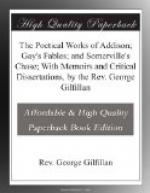20
Shall like a woman in mere spite,
Set beauty in a moral light.
Though such revenge might shock the ear
Of many a celebrated fair;
I mean that superficial race
Whose thoughts ne’er reach beyond their face;
What’s that to you? I but displease
Such ever-girlish ears as these.
Virtue can brook the thoughts of age,
That lasts the same through every stage.
30
Though you by time must suffer more
Than ever woman lost before;
To age is such indifference shown,
As if your face were not your own.
Were you by Antoninus[1] taught?
Or is it native strength of thought,
That thus, without concern or fright,
You view yourself by reason’s light?
Those eyes of so divine a ray,
What are they? Mouldering, mortal clay.
40
Those features, cast in heavenly mould,
Shall, like my coarser earth, grow old;
Like common grass, the fairest flower
Must feel the hoary season’s power.
How weak, how vain is human pride!
Dares man upon himself confide?
The wretch who glories in his gain,
Amasses heaps on heaps in vain.
Why lose we life in anxious cares,
To lay in hoards for future years?
50
Can those (when tortured by disease)
Cheer our sick heart, or purchase ease?
Can those prolong one gasp of breath,
Or calm the troubled hour of death?
What’s beauty? Call ye that your own?
A flower that fades as soon as blown.
What’s man in all his boast of sway?
Perhaps the tyrant of a day.
Alike the laws of life take place
Through every branch of human race,
60
The monarch of long regal line
Was raised from dust as frail as mine.
Can he pour health into his veins,
Or cool the fever’s restless pains?
Can he (worn down in Nature’s course)
New-brace his feeble nerves with force?
Can he (how vain is mortal power!)
Stretch life beyond the destined hour?
Consider, man; weigh well thy frame;
The king, the beggar is the same.
70
Dust forms us all. Each breathes his day,
Then sinks into his native clay.
Beneath a venerable yew,
That in the lonely church-yard grew,
Two ravens sat. In solemn croak
Thus one his hungry friend bespoke:
’Methinks I scent some rich repast;
The savour strengthens with the blast;
Snuff then, the promised feast inhale;
I taste the carcase in the gale;
80
Near yonder trees, the farmer’s steed,
From toil and daily drudgery freed,
Hath groaned his last. A dainty treat!
To birds of taste delicious meat.’
A sexton, busy at his trade,
To hear their chat suspends his spade.
Death struck him with no further thought,
Than merely as the fees he brought.
’Was ever two such blundering fowls,
Shall like a woman in mere spite,
Set beauty in a moral light.
Though such revenge might shock the ear
Of many a celebrated fair;
I mean that superficial race
Whose thoughts ne’er reach beyond their face;
What’s that to you? I but displease
Such ever-girlish ears as these.
Virtue can brook the thoughts of age,
That lasts the same through every stage.
30
Though you by time must suffer more
Than ever woman lost before;
To age is such indifference shown,
As if your face were not your own.
Were you by Antoninus[1] taught?
Or is it native strength of thought,
That thus, without concern or fright,
You view yourself by reason’s light?
Those eyes of so divine a ray,
What are they? Mouldering, mortal clay.
40
Those features, cast in heavenly mould,
Shall, like my coarser earth, grow old;
Like common grass, the fairest flower
Must feel the hoary season’s power.
How weak, how vain is human pride!
Dares man upon himself confide?
The wretch who glories in his gain,
Amasses heaps on heaps in vain.
Why lose we life in anxious cares,
To lay in hoards for future years?
50
Can those (when tortured by disease)
Cheer our sick heart, or purchase ease?
Can those prolong one gasp of breath,
Or calm the troubled hour of death?
What’s beauty? Call ye that your own?
A flower that fades as soon as blown.
What’s man in all his boast of sway?
Perhaps the tyrant of a day.
Alike the laws of life take place
Through every branch of human race,
60
The monarch of long regal line
Was raised from dust as frail as mine.
Can he pour health into his veins,
Or cool the fever’s restless pains?
Can he (worn down in Nature’s course)
New-brace his feeble nerves with force?
Can he (how vain is mortal power!)
Stretch life beyond the destined hour?
Consider, man; weigh well thy frame;
The king, the beggar is the same.
70
Dust forms us all. Each breathes his day,
Then sinks into his native clay.
Beneath a venerable yew,
That in the lonely church-yard grew,
Two ravens sat. In solemn croak
Thus one his hungry friend bespoke:
’Methinks I scent some rich repast;
The savour strengthens with the blast;
Snuff then, the promised feast inhale;
I taste the carcase in the gale;
80
Near yonder trees, the farmer’s steed,
From toil and daily drudgery freed,
Hath groaned his last. A dainty treat!
To birds of taste delicious meat.’
A sexton, busy at his trade,
To hear their chat suspends his spade.
Death struck him with no further thought,
Than merely as the fees he brought.
’Was ever two such blundering fowls,




